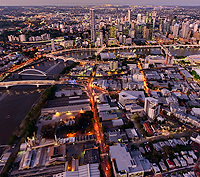
Greater Brisbane Key Corridors Performance Report
Greater Brisbane road network

This report provides information on the traffic volume and average speed for the Greater Brisbane key transport corridors over the January to June 2019 period. The corridors include Brisbane City Council (Council) and Department of Transport and Main Roads (TMR) managed roads.
This report includes information on initiatives being undertaken by both organisations to manage congestion on the road network.
There are 38 key corridors, comprising 317.2 kilometres of road, in the Greater Brisbane area. Council manages 18 of these corridors, equating to 102.1 kilometres of road and TMR manages the other 20, equating to 215.1 kilometres of road.
Report summary for January-June 2019
- Network vehicle kilometres travelled has remained consistent compared to the same period last year
- Weekday AM peak average network speed is 36 km/h (Council roads = 26 km/h and TMR roads = 42 km/h)
- Weekday PM peak average network speed is 39 km/h (Council roads = 32 km/h and TMR roads = 42 km/h)
- Bruce Highway (managed by TMR) is the busiest corridor with an average volume of 171,363 vehicles per day
- Logan Road between Klumpp Road and Old Cleveland Road (managed by Council) is the least busy corridor with 21,046 vehicles per day
- In the AM peak, February had the lowest average speed at 32 km/h, while January had the highest average speed at 42 km/h
- In the PM peak, May had the lowest average speed at 37 km/h, while January had the highest average speed at 42 km/h
- In the AM peak,
- Centenary Motorway between Logan Motorway and Ipswich Motorway (managed by TMR) had the fastest average speed at 78 km/h (100 km/h speed limit);
- Coronation Drive (managed by Council) had the slowest average speed at 19 km/h (speed limit is 60km/h)
- In the PM peak,
- Centenary Motorway between Logan Motorway and Ipswich Motorway (managed by TMR) had the fastest average speed at 96 km/h (100 km/h speed limit);
- Jubilee Terrace and Wardell Street (owned by TMR) had the slowest average speed at 24 km/h.
- On Council’s 18 key corridors, compared with the same period in 2018:
- AM peak average speed decreased by 2.2% from 26.3 km/h to 25.7 km/h;
- PM peak average speed decreased by 0.1% from 32.0 km/h to 31.9 km/h.
- On 18 of TMR’s 20 key corridors (excluding Gympie Road and Pacific Motorway (2)), compared with the same period in 2018:
- AM peak average speed increased by 6.7% from 40 km/h to 42 km/h;
- PM peak average speed increased by 0.9% from 41 km/h to 42 km/h.
Latest report:
Previous reports:
- Greater Brisbane Key Corridors Performance Report July - December 2015 (PDF - 5.3Mb)
- Key Corridors Performance Report January - June 2015 (PDF - 2Mb)
- Key Corridors Performance Report July - December 2014 (PDF - 1.7Mb)
- Key Corridors Performance Report January - June 2014 (PDF 3.3Mb).
These documents may be inaccessible to website assistive technologies. If you require any assistance accessing or interpreting these documents, phone Council on 07 3403 8888.